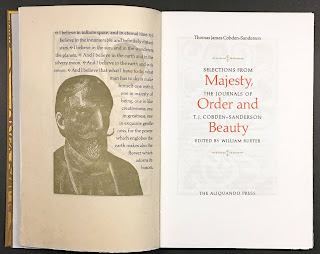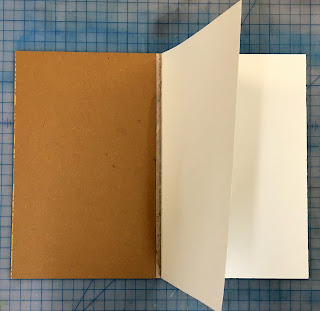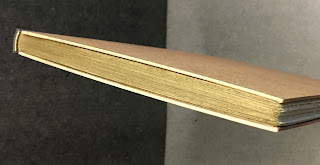When Will Rueter published Majesty, Order & Beauty in 2007, I requested a set of sheets and he kindly sent them. I wanted to put my own binding on the book. I don’t know why.
Among 100+ books published by Will, this is one of Aliquando’s high spots. It combines all the things that characterize his work: color, artfully arranged type, lovely papers plus his own wood engravings.
There should be a special place in Hell for people who ask for a set of sheets and then never bind them. If it exists I was headed for that place until this past week. The printing side of things at HM is on hiatus for a few months so I’m catching up on various binding and box-making chores, starting with Will’s book.
I’m glad I didn’t bind it until now. My initial plan had been to sew it on vellum slips laced into a limp case of Reg Lissel’s “vellum” paper, which is made from over-beaten abaca. It feels like vellum, is hypersensitive to moisture like vellum, and is almost as tough. But in truth I knew this really wasn’t the right type of binding for this book, and I just didn’t feel equal to the task. So the sheets sat in a box.
Over the past five years – since Aurora Teardrops – I’ve been focusing more on my binding (i.e. casing) skills, and they’ve come along, enough that I felt ready for Will’s sheets.
Will’s book featured spectacular gold endpapers that had been created by his great-uncle c.1900. (I think they're printed but they might be stencilled.) The endpapers dictated all the other parts of the case.
I like simple paper-over-boards cases, but from a strength and longevity perspective, they’re really only appropriate for slimmer books. Majesty, Order & Beauty consisted of five signatures, each four pages, plus the endsections; it needed stronger joints than just paper.
I’m not a fan of most quarter cases, particularly the type where the spine covering attaches to the outside of the boards. Whenever possible, I prefer a rounded spine.* So, for Will’s book, I needed something for the spine, and something for the boards.
I’ve been enjoying painting papers to use for cases. I decided to make something gold for Majesty, Order & Beauty. I started with a sheet of yellow Guarro laid, and applied a dilute wash of black acrylic. With this & each subsequent wash, I let it set for a few minutes, and then dabbed the brush all over the sheet, creating a mottled effect. After the black dried, I applied two washes of gold (not metallic), then added a bit of red to the gold and applied a final wash. A subtle compliment to the bold endpapers.
Another thing I don’t like are tipped-on endpapers. They’re lazy and add no strength to the binding. For Majesty, Order & Beauty I hinged the folded endpaper sheet around a white sheet which became the section’s center through which I would sew (below)
I sewed the sheets on tapes of Reg’s abaca vellum, and made endbands from offcuts of the endpapers. Before glueing up the spine I "gilded" the head with (metallic) gold ink applied with a stiff brush. I then gave the spine a slight round, applied rice paste and lined it with thin Japanese paper.
To make the case I lined the outer faces of each board with a plain sheet, and then adhered the cover sheet (there will be two sheets adhered to the inner face, so I want two on the outer, to balance the pull), folding in just the spine edge.
I then made the spine, laminating several sheets of 200 g watercolor paper together and rounding it as it dried. This was glued into the black abaca spine cover and dried flat.
The inside edge of each board is then attached to the spine cover, allowing a 0.25-inch joint, and pressed very hard. The portion of the board left exposed is then lined with a sheet of thickness equal to the spine cover (I used more of the yellow Guarro), to make the inside of the board flat. The remaining three edges of each board are then turned in, and the case is left in the press over night.
I fit the case around the text block to ensure my measurements were correct (I like a square of not much more than 1/16-inch) and give it a nip between boards.
Then it’s just a matter of glueing out the pastedowns and attaching the boards.
I pondered printing the title directly on the abaca spine in gold, but the printer’s busted and won’t work again for a few months, and I didn’t want to put this off, so I’ll set and print a small label when things are working again.
And just for fun, since I seem to have miscellaneous Doves Press leaves lying around everywhere, I stuck one into my unique copy of Will’s wonderful book.
(* I think too many printers fail to take advantage of their binder’s expertise when planning a book, particularly in deciding how many sheets per section – they opt for fewer thick sections, when more thin ones would give the binder more control in shaping the spine. That’s not the case with Will, who does his own binding, it’s just something I’ve seen too often. Talk to your binder early & often!)
















